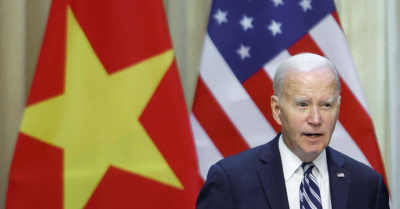Reuters-Exclusive Biden aides in talks with Vietnam for arms deal that could irk China
September 23, 2023 4 min 673 words
这则报道揭示了拜登政府正在与越南就一项历史上最大规模的军火交易进行谈判,可能会引起中国的不满,同时将俄罗斯排挤在一边。这个交易可能包括出售一批美国F-16战斗机,这将进一步强化华盛顿与河内之间的伙伴关系,特别是在东南亚地区因南海争端与北京紧张关系升温的情况下。 这个消息传来时,交易仍处于早期阶段,确切的条款尚未敲定,也可能无法最终达成。然而,这已成为过去一个月越南和美国官方在河内、纽约和华盛顿举行的会谈中的一个关键话题。 华盛顿考虑为这些昂贵装备制定特殊融资条件,这可能有助于财政拮据的河内摆脱其传统对廉价俄制武器的依赖。一位未透露姓名的消息人士表示,白宫和越南外交部的发言人未回应置评请求。 这则报道反映了美国政府试图在印太地区平衡与中国的地缘政治竞争,同时负责管理两个超级大国的关系。这一举措可能会加剧中国的不满,因为越南是中国的邻国,而中国一直警惕西方试图封锁北京的努力。越南与中国之间长期存在的领土争端在南海升温,这解释了越南为何寻求加强海上防御。 然而,这一报道也提到了一些挑战,包括高昂的美国武器成本以及相关装备的培训。此外,乌克兰战争使越南与俄罗斯的关系变得复杂,导致获取俄制武器的供应和备件变得更加困难。 最后,这个报道揭示了越南正在与俄罗斯就一项新的军火供应协议进行积极谈判,这可能会引发美国的制裁。总的来说,这个报道突显了印太地区的地缘政治竞争以及美国与越南之间关系的演变,以及如何应对这些复杂的挑战。
The Biden administration is in talks with Vietnam over an agreement for the largest arms transfer in history between the ex-Cold War adversaries, according to two people familiar with a deal that could irk China and sideline Russia.
A package, which could come together within the next year, could consummate the newly upgraded partnership between Washington and Hanoi with the sale of a fleet of American F-16 fighter jets as the Southeast Asian nation faces tensions with Beijing in the disputed South China Sea, one of the people said.
The deal is still in its early stages, with exact terms yet to be worked out, and may not come together. But it was a key topic of Vietnamese-U.S. official talks in Hanoi, New York and Washington over the past month.
Washington is considering structuring special financing terms for the pricey equipment that could help cash-strapped Hanoi steer away from its traditional reliance on lower-cost, Russian-made arms, according to the other source, who declined to be named.
Spokespersons for the White House and Vietnamese foreign ministry did not respond to requests for comment.
"We have a very productive and promising security relationship with the Vietnamese and we do see interesting movement from them in some U.S. systems, in particular anything that can help them better monitor their maritime domain, perhaps transport aircraft and some other platforms," said a U.S. official.
"Part of what we're working on internally as the U.S. government is being creative about how we could try to provide better financing options to Vietnam to get them things that might be really useful to them."
A major U.S.-Vietnam arms deal could aggravate China, Vietnam's larger neighbor, which is wary of Western efforts to box in Beijing. A long-simmering territorial dispute between Vietnam and China is heating up in the South China Sea and explains why Vietnam is looking to build up maritime defenses.
"They are developing asymmetric defensive capabilities, but (want) to do so without triggering a response from China," said Jeffrey Ordaniel, associate professor of international security studies at Tokyo International University and director for maritime security at Pacific Forum International, a think tank. "It is a delicate balancing act."
Ordaniel said Washington should shift funds set aside for financing militaries in the Middle East to the Indo-Pacific region "so partners like Vietnam, the Philippines and Taiwan can afford the weapons they need to resist Beijing."
The Biden administration has said it is trying to balance geopolitical competition with China, including in the Pacific, and responsibly managing the two superpowers' relationship.
Earlier this month, Vietnam upgraded Washington to Hanoi's highest diplomatic status, alongside China and Russia, when U.S. President Joe Biden visited the country.
The diplomatic turnaround marks a sharp pivot nearly a half-century after the end of the Vietnam War.
Since an arms embargo was lifted in 2016, U.S. defense exports to Vietnam have been limited to coast guard ships and trainer aircraft, while Russia has supplied about 80% of the country's arsenal.
Vietnam spends an estimated $2 billion annually in arms imports, and Washington is optimistic that they can shift a share of that budget over the long term to weapons from the United States or its allies and partners, especially South Korea and India.
The cost of U.S. weaponry is a major obstacle, as is training on the equipment, and is among the reasons the country has taken in less than $400 million of American arms over the past decade.
"Vietnamese officials are well aware that they need to spread the wealth," the U.S. official said. "We need to lead the charge in helping Vietnam get what it needs."
Meanwhile, the war in Ukraine has complicated Hanoi's longstanding relationship with Moscow, making supplies and spare parts for Russian-made arms harder to acquire. Nonetheless, Vietnam is also actively in talks with Moscow over a new arms supply deal that could trigger U.S. sanctions, Reuters has reported.

